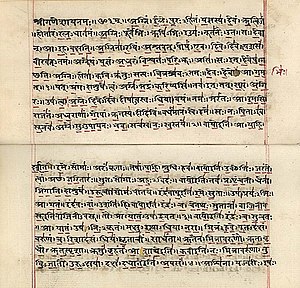
Back Rigveda AF ርግ ቬዳ AM ऋग्वेद ANP ريجفيدا Arabic ঋকবেদ AS Rigveda AST Riqveda AZ Ригведа BA Régwéda BAN Rigvėda BAT-SMG

An Rigveda o Rig Veda (Sanskrito: ऋग्वेद, ṛgveda, hale sa rig "pag-omaw" asin veda "kaaraman") sarong suanoy na koleksion nin mga himnong Indiyano na Vedic Sanskrit (sūktas). Saro iyan sa apat na sagradong kanonikal na mga tekstong Hindu (śruti) na inaapod na Veda.[1]
An Rigveda iyo an pinakagurang na midbid na tekstong Vedic Sanskrit. An amay na mga suon kaini kabilang sa pinakadaan na mga tekstong eksistido sa arinman na tataramon na Indo-Europeo. An mga tanog asin mga teksto kan Rigveda ipinapaabot sa paagi kan pagtaram poon pa kan ika-2ng milenyo BCE. An mga ebidensiyang pilolohikal asin linggwistika nagpaparisa na an bilog na Rigveda Samhita kinompos sa norteng-solnopan na rehiyon kan subkontinenteng Indiyano (hilingon) Rigvedic na salog), na posibleng marhay na ginibo sa pag - oltanan kan 1500 asin 1000 BCE, maski na ngani igwa nin aproksimasyon na c. Kinua 1900-200 BCE an itinao.[2][3]
Suruon an teksto, na binibilog kan Samhita, Brahmanas, Aranyakas asin Upanishads. An Rigveda Samhita iyo an pinakalaog na teksto asin koleksiyon nin 10 libro (ma ⁇ a) na igwang 1,028 himno (sūktas) sa mga 10,600 na bersikulo (inapod ⁇ c, eponymous of the ngaran na Rigveda). Sa walong libro- Books 2 sagkod 9- na kinomponer an kaenot - enote, an mga himno pangenot na nagpapaliwanag nin kosmolohiya, mga ritwal, asin mga seremonya asin mga dios nin pag - omaw. An mas dai pa sana nahahaloy na mga libro (Books 1 asin 10) sa sarong kabtang nagtutukar man sa mga pilosopikal o mga espekulatibong hapot, mga birtud na arog baga kan dāna (charity) sa sosyedad, mga hapot manongod sa ginikanan kan uniberso asin sa naturalesa nin Dios, asin iba pang metapisikal na mga isyu sa saindang mga himno. ⁇ . – – [4][5]
An nagkapira sa mga bersikulo kaiyan padagos na sinasambit durante kan pamibing Hindu asin pagselebrar nin mga ritwal nin teksto (arog baga nin mga kasal), na ginigibo iyan na posibleng iyo an pinakadaan na relihiyosong teksto sa kinaban na padagos na ginagamit.[6][7]
- ↑ Antonio de Nicholas (2003), Meditations Through the Rig Veda: Four-Dimensional Man, New York: Authors Choice Press, ISBN 978-0-595-26925-9, p. 273
- ↑ Edwin F. Bryant (2015). The Yoga Sutras of Patañjali: A New Edition, Translation, and Commentary. Farrar, Straus and Giroux. pp. 565–566. ISBN 978-1-4299-9598-6.
- ↑ Lucas F. Johnston, Whitney Bauman (2014). Science and Religion: One Planet, Many Possibilities. Routledge. p. 179.
- ↑ Werner, Karel (1994). A Popular Dictionary of Hinduism. Curzon Press. ISBN 0-7007-1049-3.
- ↑ Examples:
Verse 1.164.34, "What is the ultimate limit of the earth?", "What is the center of the universe?", "What is the semen of the cosmic horse?", "What is the ultimate source of human speech?"
Verse 1.164.34, "Who gave blood, soul, spirit to the earth?", "How could the unstructured universe give origin to this structured world?"
Verse 1.164.5, "Where does the sun hide in the night?", "Where do gods live?"
Verse 1.164.6, "What, where is the unborn support for the born universe?";
Verse 1.164.20 (a hymn that is widely cited in the Upanishads as the parable of the Body and the Soul): "Two birds with fair wings, inseparable companions; Have found refuge in the same sheltering tree. One incessantly eats from the fig tree; the other, not eating, just looks on.";
Rigveda Book 1, Hymn 164 Wikisource;
See translations of these verses: Stephanie W. Jamison (tr.) & Joel P. Brereton (tr.) (2014) - ↑ Klaus Klostermaier (1984). Mythologies and Philosophies of Salvation in the Theistic Traditions of India. Wilfrid Laurier University Press. p. 6. ISBN 978-0-88920-158-3.
- ↑ Lester Kurtz (2015), Gods in the Global Village, SAGE Publications, ISBN 978-1-4833-7412-3, p. 64, Quote: "The 1,028 hymns of the Rigveda are recited at initiations, weddings and funerals"